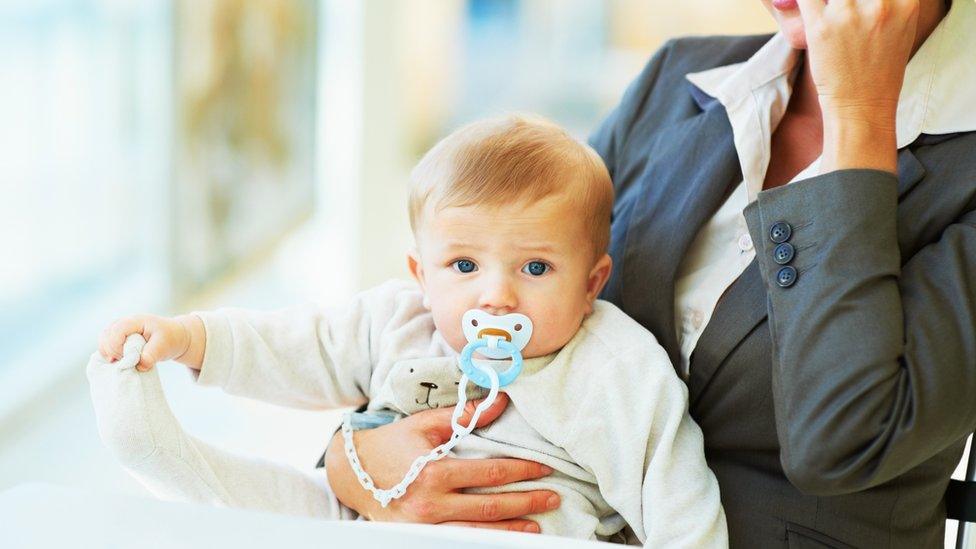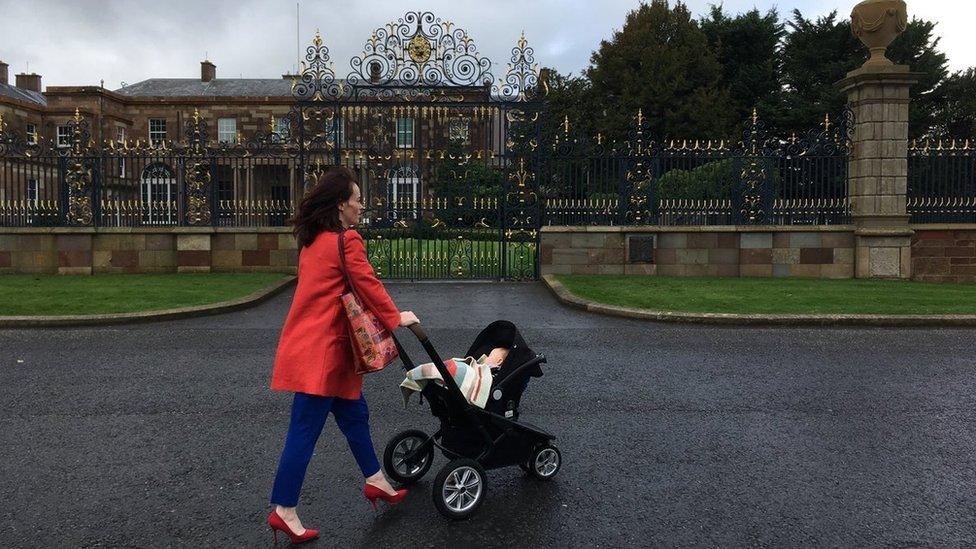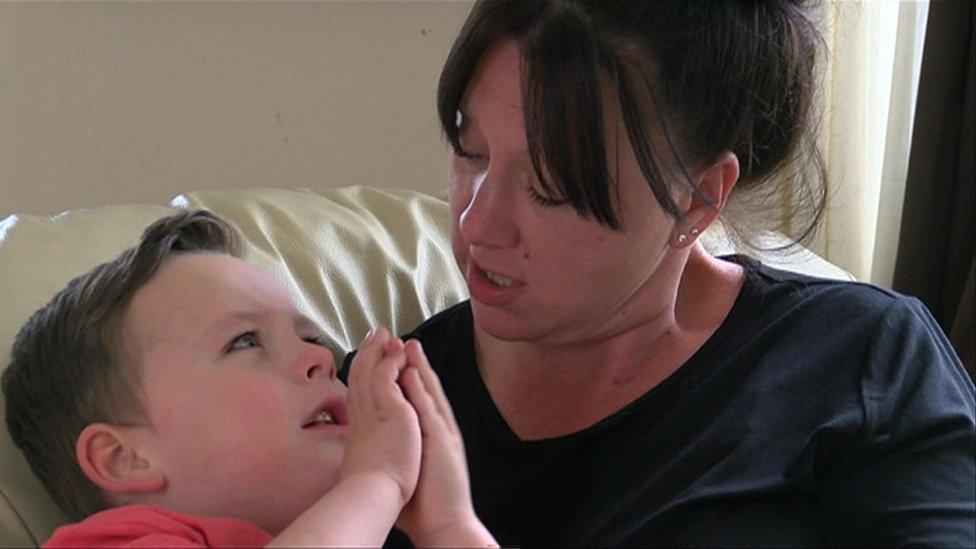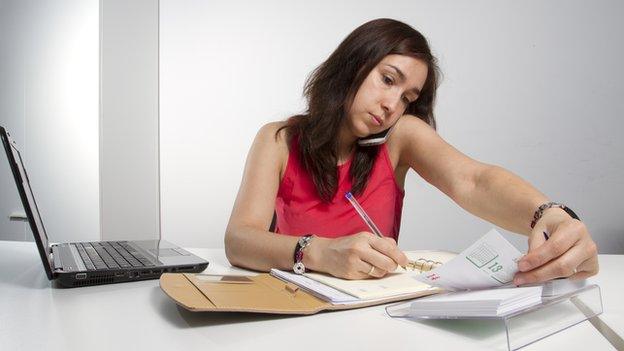Should you be allowed to take your child into work?
- Published

Could workplace childcare facilities help to close the gender pay gap?
Should working parents be allowed to take their child into their workplace while they are on duty?
A Stormont politician's childcare decisions sparked debate after she brought her baby into a meeting with Northern Ireland's secretary of state.
Nichola Mallon said her seven-month-old son, Emmett, played quietly at her feet with his toys while she talked business with Cabinet minister Julian Smith.
The SDLP deputy leader received both strong criticism and enthusiastic support on social media.
Opinion divided sharply on whether she was breaking down barriers for working mothers, or using her position to take advantage of options most working parents do not share.

The ministerial meeting at Hillsborough Castle was nothing new for young Emmett
One Twitter user called her "a bimbo" and said: "Sorry, she is being paid to represent us as an MLA, how can she conduct herself properly if she has a hungry infant in tow?"
But another tweeted: "How much of a nicer place would we be living in if this was the norm instead of the exception?"
Interviewed in the BBC's Evening Extra studio with her baby on her lap, Ms Mallon said she has been bringing Emmett to meetings since he was two weeks old.
"I'm in a job where you don't get maternity leave," she explained.
"So the choice I have is that I stay at home for these very formative months with Emmet because I'm still feeding him and not serve my constituents, or serve my constituents and leave Emmet in a crèche for seven or eight hours a day."
As Emmett gurgled into the microphone, she added: "I'm just trying to be the best MLA that I can and the best mummy that I can."
She is not alone - DUP MLA and new mum Carla Lockhart also takes her baby to meetings, citing lack of maternity leave. , external
Could their example help to improve work-life balance, close the gender gap or encourage more breastfeeding in Northern Ireland, which currently has the lowest rate in the UK?
Mark McAllister from the Labour Relations Agency (LRA) was not surprised the issue generated "very polarised views".
"I have a two-and-a-half-year-old son and I know if I brought him into work, he would destroy the building room by room very quickly," he laughed.

Mark McAllister is director of employment relations services at the Labour Relations Agency
But he suggested the overall concept was not "impossible" in the future, given how much workplace culture has changed over recent decades.
"Years gone by, it would have been breastfeeding in the workplace that raised these polarised views," he said.
"We've moved on and we live in more enlightened times."
Do parents ever have the right to bring their child into work?
"There is no standalone, statutory right for an employee to bring their child into work," said Mr McAllister.
He explained workers are entitled to time off to care for dependants in "emergency circumstances" but employers are not legally obliged to allow employees' children onto their premises.
The Equality Commission for Northern Ireland said equality legislation "does not cover any right to bring children into work, even in an emergency".
The Employers for Childcare charity pointed out not every workplace is a safe environment for children.
What happens if no-one else is available to look after your child?

Some workplace are just too dangerous to accommodate little visitors
All employees have the right to "reasonable" time off work to deal with an emergency involving someone who depends on them.
Dependants can include their children; spouse; partner or parents.
Employers are not obliged to pay staff for these absences, though some choose to.
Aoife Hamilton from Employers for Childcare said firms could also consider allowing staff to work from home for a period.
How much time can you take off work in a childcare emergency?

Parents cannot leave their children unaccompanied and employment law takes account of childcare emergencies
There is no set time limit on when an employee must return to work, external, it depends on the circumstances.
"There's a lot of debate about what a reasonable amount of time off is", said Mr McAllister.
"Some employers will decide it's a day, some will say it's two days, some will be a bit more generous.
"It might be unpaid, and that might be what forces the hand of the employee to get back into work quickly."
What about non-emergency childcare issues?
All working parents are entitled to a total of 18 weeks unpaid leave, external to care for a child until they reach 18.
Ms Hamilton explained this requires notice and is usually taken in week-long portions over 18 years.
"That recognises responsibility for caring for a child doesn't just end after those first few years."
Employers can also consider flexible working, external requests.
Who is legally responsible for a child in a workplace?

Children who enter their parents' workplace must be supervised at all times for safety reasons
Parents are still responsible for their child's welfare, but employers take on some legal responsibilities if they allow staff to take children into their premises.
"They'd need to be looking at health and safety, at insurance... is the building safe for a child?" said Ms Hamilton.
"For some employers it will work really well, for others it's just not going to be possible."
Mr McAllister said while employers have liability in regard to the building, workers have a duty to ensure their children are not "running around unsupervised in case they have an accident".
He added firms would be concerned about employers' liability insurance and public liability insurance.
Does allowing a child into a workplace set a precedent?

Societal attitudes to working parents' rights have vastly changed in the last few decades
Employers for Childcare advised a one-off incident "could potentially open the gates to other parents expecting that they would be able to bring their children into work".
"Because of that, we would encourage any employer considering this to look at establishing a clear and consistent policy and communicating that to all staff to avoid HR issues," said Ms Hamilton.
Mr McAllister said employers might worry about their workplace "becoming a de facto crèche" or having to pay a crèche assistant.
"The image that might be conjured up in an employer's head is, 'we have to set aside a room here'."
But he said the challenge is to "break down barriers to the traditional way of thinking" by pointing out potential benefits.
"If women could say: "I can go back to work because I can bring my child and there's a provision for that', then issues like the gender pay gap would be addressed because women wouldn't be taking protracted periods of time out of the workplace."
He added there is still a "motherhood penalty" for women who cannot afford to return to work because of childcare costs.
- Published8 July 2019

- Published22 May 2019

- Published16 January 2017

- Published25 June 2015
